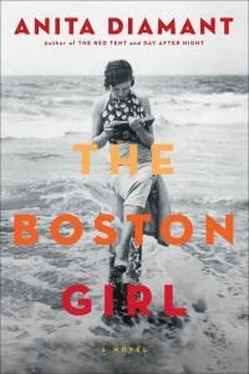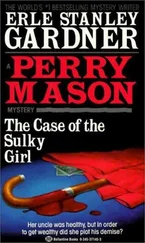Miss Holbrooke said, “These ladies are very accomplished, I assure you.”
Filomena stared her in the eye and said, “Miss Edith Green is an instructor at the School of the Museum of Fine Arts and she is the one who told me to focus all my attention on drawing this week. I’m sure you agree I should take her assignment seriously.”
Miss Holbrooke couldn’t say no to that and walked away with her tail between her legs.
“Did Miss Green really say that?” I asked.
Filomena laughed. “She could have. Edith Green thinks everything rests on drawing. You can see it in the designs on the pottery.”
“I like the way you do the trees,” I said. “It’s just a few lines but they seem alive.”
“That’s exactly right,” Filomena said. “You have a good eye.”
That was a compliment I never forgot—obviously.
Toward the end of the week, Filomena switched tables and joined the Mixed Nuts. Gussie teased her and asked if she’d gotten kicked out of the Italian club for hanging around so much with the Jews and the Irish.
“I just need to talk about something besides weddings,” Filomena said. “They’re getting married this year! All of them.”
Helen said, “Your time will come.”
“Not me,” said Filomena. “I’m never getting married.”
Rose said she was too pretty to be an old maid.
Gussie didn’t like that. “Filomena may want to do other things with her life. For example, I am going to college.”
“And after that, she’s going to law school,” said Helen.
“But don’t you want a family?” Rose asked.
Gussie said, “Helen’s going to have children; I’ll borrow hers.”
Helen blushed and Irene said, “Looks like she already knows who the father’s going to be.”
“Don’t embarrass her,” said Rose. “Besides, she’d tell us if there was someone, wouldn’t you, Helen?”
“My sister can have her pick,” said Gussie. “What about you, Rose? Irene? Any prospects? Addie?”
“Addie’s too young to think about that,” Filomena said.
I was too young but it was impossible not to think about marriage. Mameh talked about Celia’s “prospects” all the time, and at every Saturday Club meeting, there was talk about weddings the girls had been to or weddings they were going to. Even the Ediths, when they heard about an engagement, acted like it was some kind of victory—and they were all for women’s rights and education.
I wasn’t so sure about marriage. I knew my parents were miserable, and from what I heard in the air shaft, other married people said horrible things to each other all the time. On the other hand, who wouldn’t want to be in love and have a man look at me the way Owen Moore looked at Mary Pickford? I used to leave those movies feeling sad that nothing like that would ever happen to me, but I always went back for another happy ending.
In the magazine stories, I could imagine myself as one of the smart, spunky girls chased by men who loved them for their brains and gumption. Those girls were airplane daredevils, or race car drivers, or even doctors, but in the end they gave it up for love and marriage.
When I asked Filomena what she would do if she fell in love, she shrugged. “I know that being a wife would mean giving up art, which is what makes me happy. When I say I don’t want to get married, my sisters tell me I’m being selfish, and maybe I am. Or maybe there’s something wrong with me.”
I said I didn’t think there was anything wrong with her.
“I wish my sisters were more like you, Addie,” she said. “Betty and Celia are lucky to have such a good listener in the family.”
Actually, my sisters and I didn’t talk much. They were so much older than me, for one thing; Celia was so quiet, and as for Betty, I saw her once in a blue moon and only when she was sure Mameh would be out of the house and she could sneak in and visit. Even then, she mostly talked to Celia and Papa.
Like nothing I could actually touch.
I didn’t know my father very well. It wasn’t like today, when fathers change diapers and read books to their children. When I was growing up, men worked all day and when they came home we were supposed to be quiet and leave them alone.
Papa was a good-looking man; he had a long, thin face, with light-blue eyes and brown hair like Celia’s. He was particular about his clothes, that they should be clean and neat. Whenever he saw a Jewish man in the street dressed sloppy, he said, “They’ll think we’re all peasants.”
What I knew about him mostly came from Betty. He grew up in a little shtetl that was hardly even a town, just a place with an inn, a synagogue, and a market once a week where people bought and sold everything. Papa’s family had cows, so they weren’t the poorest, but they didn’t have enough money to send him or his brothers to school. Instead they learned with their father, my grandfather, who’d studied at some big yeshiva as a boy. I remember Papa had a very old prayer book; maybe it was from his family.
When Papa was eighteen or nineteen, there was a cholera epidemic that killed his father and brothers, so he was in charge of his mother and two sisters. He sold the cows so the girls could get married, and then his mother matched him up with Mameh, who was from a poor family but managed to get her a horse for a dowry, which meant Papa could make a living moving and hauling things around.
Betty and Celia were born over there, though they were called Bronia and Sima then. My mother was pregnant with a third baby when someone accused my father of stealing a silver cup from the church. In those days, that was the same as a death sentence for a Jew, so he came to America with the two girls. They were maybe ten and twelve years old but they went to work with him so he could keep an eye on them. When Papa got a letter that said Mameh had had a baby boy, he left them alone at nights and took another job to get the money for her ticket faster.
When Mameh came, she got off the ship alone. Nahum—she had named the baby for Papa’s father—had died on the trip over. They had thrown his body into the sea.
All around them, people were smiling and happy to be in America, but she was sobbing and Papa was tearing his clothes.
Betty and Celia were there, too. What an awful memory that must have been.
Mameh had another boy in America, but he died when he was three days old and I never knew his name—if they even gave him one. After I was born, there were no more babies.
My mother thought coming to America was a terrible mistake and she never let Papa forget it. “We should have stayed where we were,” she said. “Your son wouldn’t have died on that miserable boat. Our daughters would be married and I’d have grandchildren on my lap.”
Usually my father didn’t answer but sometimes he got fed up. “You would have been better off if they’d killed me?” he said. And then he would leave the house and go to his little shul, a few blocks away, where nobody yelled at him.
He was home in the evening, gone in the morning, like a shadow. Like nothing I could actually touch.
You must be the smart one.
I threw up on the boat all the way back to Boston from the lodge, but it wasn’t from seasickness. All week, I hadn’t let myself think about what was going to happen when I got home, but at that point I couldn’t think of anything else and that’s what made me sick to my stomach.
What if Mameh wouldn’t let me back in the house? None of my friends had a place for me, I had no idea where Betty was living, and I was not going to ask Miss Chevalier—not after all she’d already done for me. My only hope was that Celia would stick up for me and get my father on her side, and that would mean a huge screaming fight at the least.
Читать дальше












